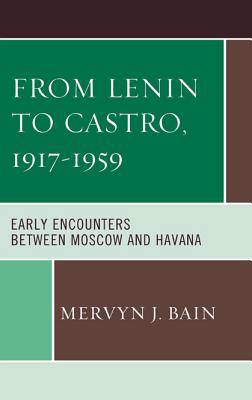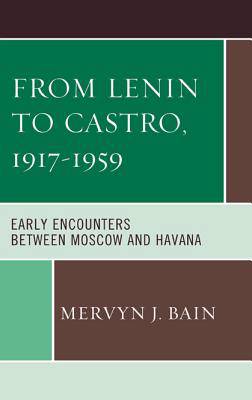
- Afhalen na 1 uur in een winkel met voorraad
- Gratis thuislevering in België vanaf € 30
- Ruim aanbod met 7 miljoen producten
- Afhalen na 1 uur in een winkel met voorraad
- Gratis thuislevering in België vanaf € 30
- Ruim aanbod met 7 miljoen producten
Zoeken
From Lenin to Castro, 1917-1959
Early Encounters Between Moscow and Havana
Mervyn J Bain
Paperback | Engels
€ 98,45
+ 196 punten
Omschrijving
This book addresses the relationship between Moscow and Havana in the period between the Russian and Cuban Revolutions, i.e. from November 1917 to January 1959. It analyzes the reasons why in this era before the Cuban Revolution, which is traditionally thought to have ignited Moscow's interest in the Caribbean island, a relationship existed between the two countries at a variety of different levels. In order to do this, both the attention that the Third International, or Comintern, gave to Cuba, as well as Moscow's formal state-to-state relations with Havana, are examined. In addition, United States policy towards both socialism and the Soviet Union are analyzed, due to the role that Washington played in Cuba prior to the Cuban Revolution. Following this, an examination of the events, process and dynamics that characterized the nature of the relationship between Moscow and Havana from 1917 to 1959 will be conducted. A number of conclusions will be given, but the primary one is that prior to January 1959, the Kremlin took considerable interest in Cuba and did not suffer from "geographical fatalism," as has traditionally been thought. This is significant in itself, but also in light of the relationship that rapidly developed between Moscow and Havana in the aftermath of the Cuban Revolution, as a number of factors that were important in the pre-1959 relationship would also be significant after 1959. Furthermore, this analysis is also important for the contemporary bilateral relationship between Russia and Cuba, as both governments have made increasing reference to the multifaceted relationship that existed prior to 1959.
Specificaties
Betrokkenen
- Auteur(s):
- Uitgeverij:
Inhoud
- Aantal bladzijden:
- 170
- Taal:
- Engels
Eigenschappen
- Productcode (EAN):
- 9781498515412
- Verschijningsdatum:
- 25/03/2015
- Uitvoering:
- Paperback
- Formaat:
- Trade paperback (VS)
- Afmetingen:
- 150 mm x 231 mm
- Gewicht:
- 226 g

Alleen bij Standaard Boekhandel
+ 196 punten op je klantenkaart van Standaard Boekhandel
Beoordelingen
We publiceren alleen reviews die voldoen aan de voorwaarden voor reviews. Bekijk onze voorwaarden voor reviews.








